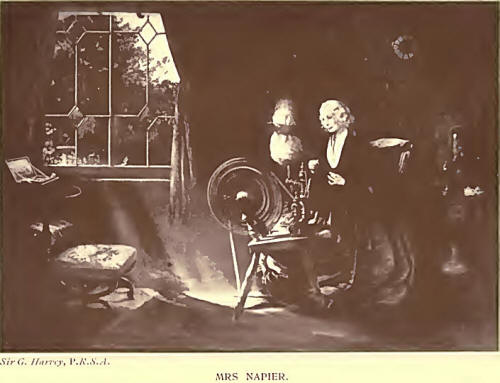|
In 1868 Mr and Mrs Napier celebrated their golden
wedding, and friends came from far and near to offer congratulations
and good wishes for their happiness.
What a change had taken place in these fifty years!
Instead of the obscure mechanic living in a humble dwelling in
Weaver Street, struggling to earn a subsistence for himself and his
young wife, he was now the most prominent business man in the West
of Scotland, his residence a veritable palace, his society courted
by many of the great of the land. Yet in the midst of all his
prosperity, Napier remained essentially a family man, and he loved
to spend his time with her who had been the sharer of his joys and
sorrows through so many long years.
His old friend Sir Spencer Robinson, Controller of
the Navy, writing him on this occasion, said :—
Allow me to hope that your anniversary will be as
prosperous and as happy as we sincerely wish it may be. I quite
understand how short a time fifty years may be to look back upon;
but it is certainly a great and unspeakable blessing to be able to
look back on fifty years of an honoured, useful, successful public
life, shared, assisted, and blessed during that long period by the
closest and dearest of human relations.
Mrs Napier was well known for her sincerity and
uniform kindness to all, and there was constant reference made to
her by her husband's numerous correspondents.
One of her favourite occupations was the spinning of
flax; and Sir George Harvey, President of the Royal Scottish
Academy, painted her portrait in a most characteristic attitude,
seated at her spinning-wheel. Sir George was very pleased with this
work; and having expressed a desire to her Majesty’s Commissioners
that his art should be represented by it in the International
Exhibition of 1872, the picture was publicly exhibited there.
Though Mr Napier had good cause for rejoicing, still
this joy was tempered with sadness, as the number of his friends was
gradually lessening. Most of his early acquaintances, including the
Melvills, Asshe-ton Smith, Wood, Duncan, Cunard, and his old manager
Elder, were gone. From his own immediate circle he had lost his
brother Peter and his three sons-in-law, Hastie, Wilkin, and Rigby.
In 1869 his cousin, David Napier, passed away, and his death was
followed some time afterwards by that of his brother James, with
whom he had been so closely associated.

These partings he felt sorely; but a heavier trial
awaited him. In the autumn of 1875 Mrs Napier, who for some time
before had not been robust, peacefully passed away, leaving his home
desolate. A few lines written to his nephew, James S. Napier,
expressed his feelings :—
“23rd October 1875.
“My dear James,—It is my most melancholy duty to
inform you that about 6 o’clock this night you have lost a kind
friend, and I one of the very best of wives. Inform any friends, as
I am not in a mood to do anything.—Yours always, R. Napier.”
His remaining days were summed up in this pathetic
sentence, “I am not in a mood to do anything.” Up to this time he
had taken an active part in everything going on around him, but this
bereavement so affected him that he ceased to have any special
interest in his former pursuits.
A few months later he was attacked with serious
illness, from which he never rallied, and he died on 23rd June 1876,
in the eighty-sixth year of his age.
To meet the wishes of many friends the funeral was a
public one.
The place of sepulture was adjacent to the old
churchyard of his native town, Dumbarton, where lay the bones of his
ancestors, and where his wife was buried.
On the day of the funeral the inhabitants of
Dumbarton, Helensburgh, and Govan showed their regard by closing
their premises, and special trains from Helensburgh and from Glasgow
brought many hundreds of those who desired to pay the last tribute
of respect.
At Dalreoch Toll the cortege was joined by the
immediate friends of the deceased, and by fourteen hundred of his
workmen, and the sorrowful procession wended its way to the parish
church.
When the company were assembled his eldest son
addressed them as follows :—
I have to thank you for myself, and on behalf of my
brother and sisters, for your kindness at meeting us to-day. It was
my father’s wish, shortly after my mother’s death, that at his own
burial no special invitations should be sent, and we have acted
accordingly. Your presence here to-day shows us more than anything
could do the high respect in which he was held during his life, and
for which we are sincerely grateful. His grief at the loss of my
mother so affected him that he lost all interest in his former
pursuits. About three months ago he became seriously ill, but from
the effects of this he so far recovered as to be able on several
occasions to go out in a carriage for a few miles. But about six
weeks ago he had a second attack, and from this he never recovered,
but got gradually weaker and weaker till lie died. We do not know
whether he suffered pain or not. He was, however, very uneasy till
within twenty-four hours of his death, when he appeared to be
asleep, with an occasional waking up for a short time. We believe he
was sensible to the last.
A service was conducted by his friends the Rev. Dr
Jamieson of St Paul's, Glasgow, and the Rev. Laurie Fogo of Row, and
thereafter the procession being formed up on each side, the coffin
was carried by some of his oldest workmen to its last resting-place. |

